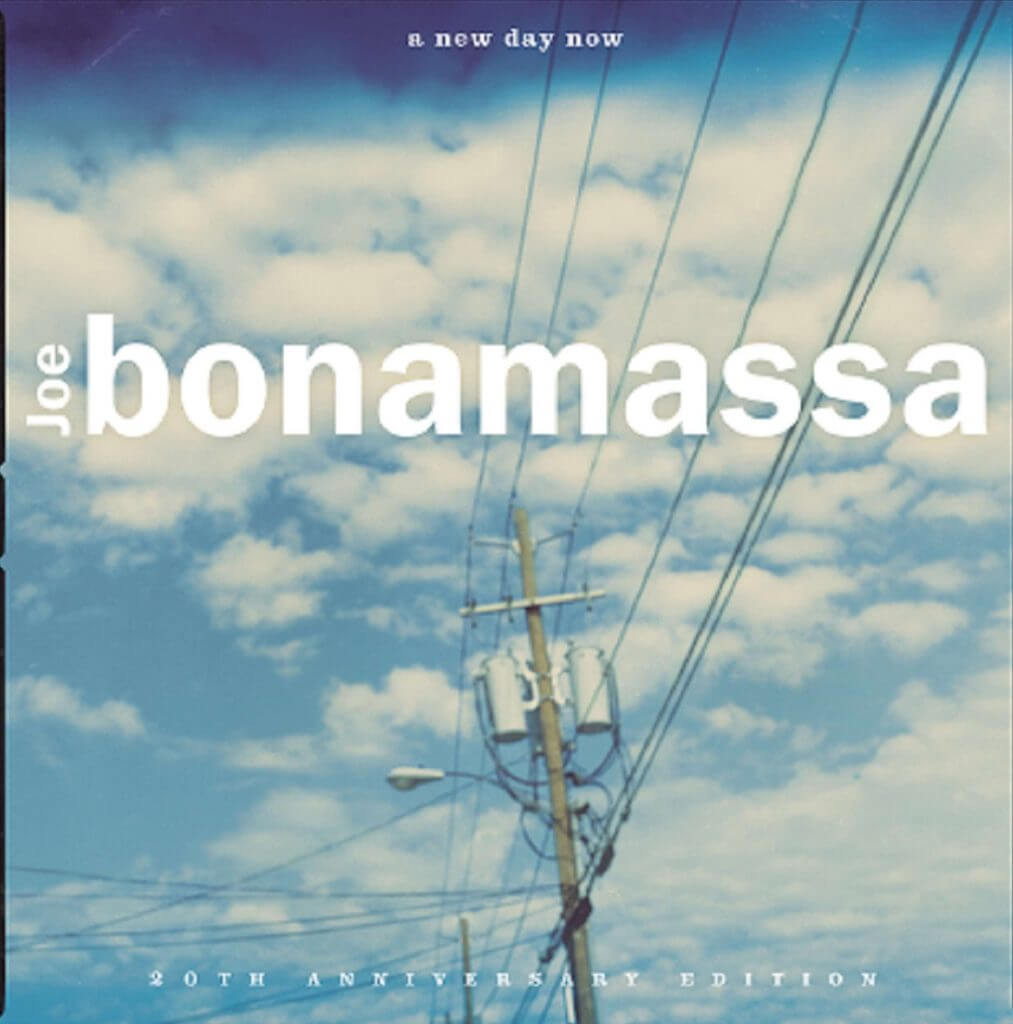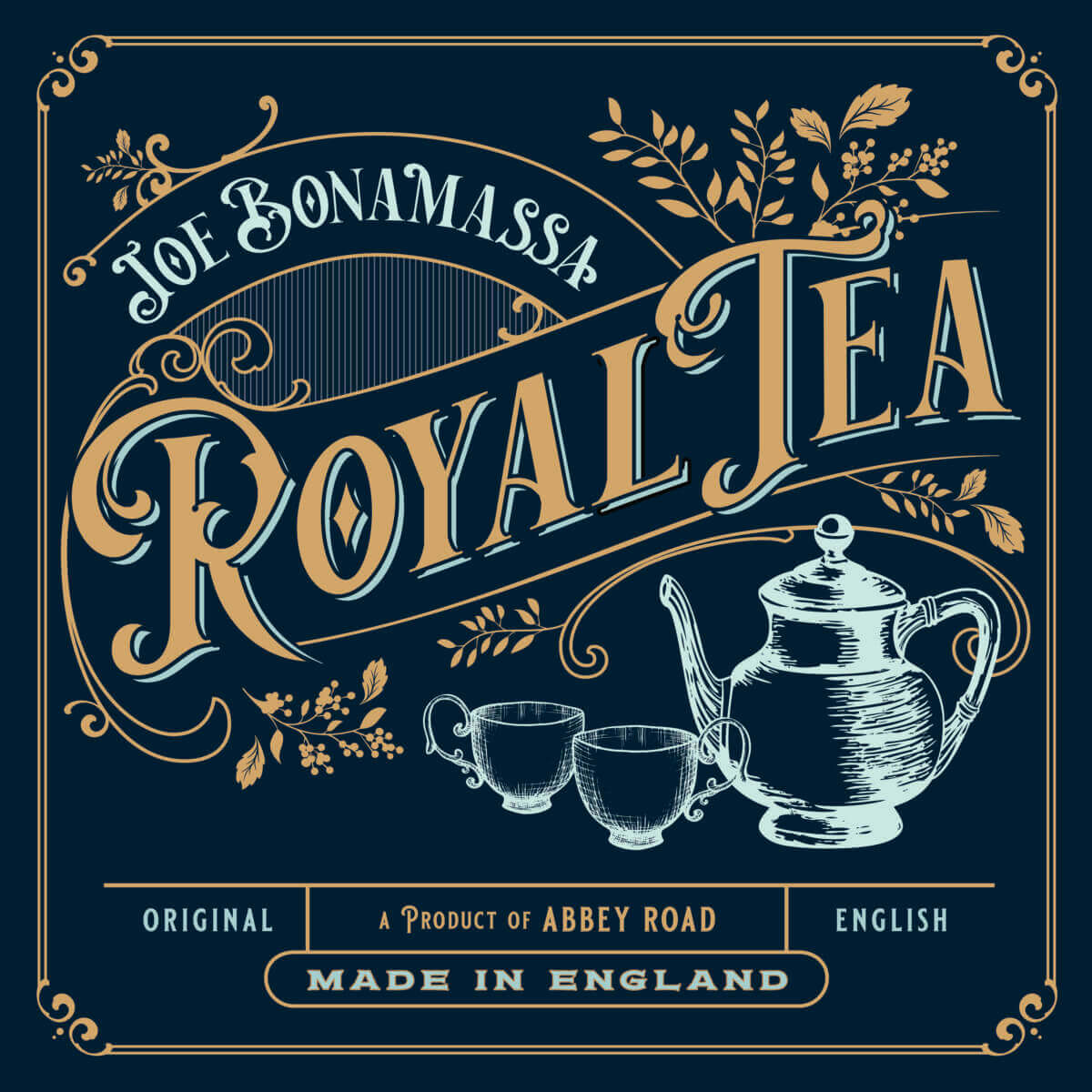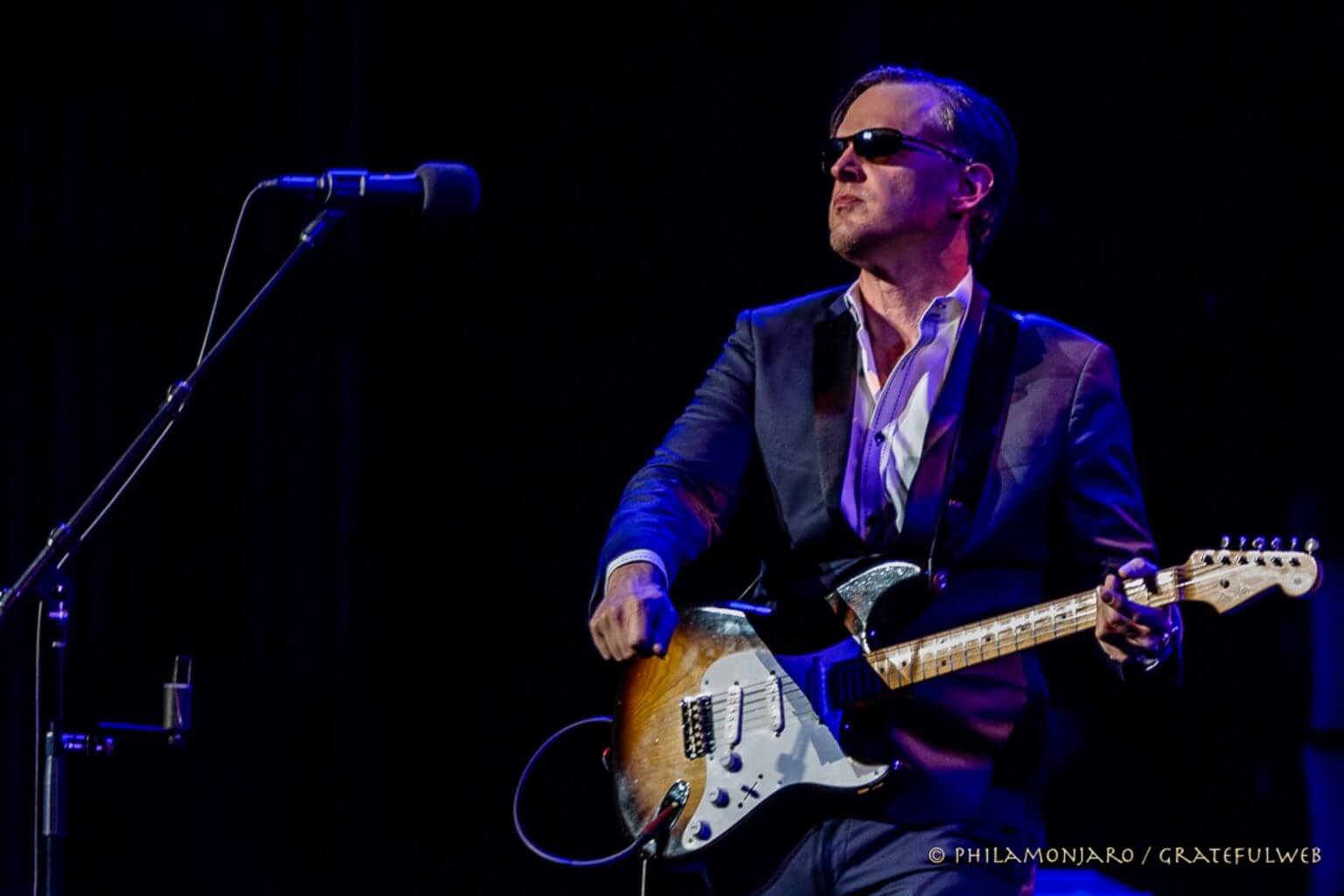Blues guitarist Joe Bonamassa appreciates musical history. You hear it in his music, and even see it in his epic collection of vintage guitars. But he’s also not afraid to change the past.

His two latest projects have him looking back in time. Royal Tea, recorded in the famed Abbey Road Studio, is his tribute to the 60s British blues rock that inspired him. And A New Day Now is his 20th anniversary reissue of A New Day Yesterday, Bonamassa’s solo debut. And so, to the naked eye, it might seem like the standard look back that tends to happen as one ages.
Except that A New Day Now features new vocals from Bonamassa. “[The vocals] bothered me more and more and more over the years,” he said. “Like, I learned how to sing better, as my range cleared, as my diction got better, as I was able to find my head voice and focus on pitch and phrasing and nuance, the early stuff bothered me more and more.” And so, breaking the most important rule of time travel, he’s changing the past. “I’m the most nostalgic person in the world. I hate when people rip out patina. But when it comes to my voice, I don’t like patina. I like it nice and tuned.”
It’s a bold move for a popular album that eventually hit number 9 on the Billboard blues chart. [A New Day Now hit #1 making it Bonamassa’s 23rd, #1 career album]. It’s also a surprising move because Bonamassa is known for his business acumen as well as his chops (on his site, you can buy everything from golf balls featuring Bonamassa hitting a ball with a Les Paul, to guitar amps. He also has blues cruises around the world. He’s a franchise). For Bonamassa, the marketing is as much a part of the job as the music. “Some musicians may not say this publicly, but I don’t really know any of them that start off and put themselves out there to be in the scene or whatever, and don’t want to play in front of as many people as they can,” he said. “I don’t know anybody who prefers empty rooms. It doesn’t make any fucking sense. A sold out show is a good feeling.”
So while he knows some fans love Yesterday‘s original vocals, and the safer move would be to just leave the singing alone, he still went ahead and re-recorded them, with plans to do the same for the upcoming 2023 reissue of Blues Deluxe. “I don’t want to sell the same thing twice,” he said. “It’s like if you take a house, and you strip it down to its frame and then you put new siding, and you put new walls. It’s same house, only a different version of the house.”
Royal Tea is Bonamassa’s take on classic British blues rock albums, like Jeff Beck’s Truth and John Mayall’s Beano, but with his own songs. Written with ex-Cream lyricist Pete Brown and a band featuring former Whitesnake guitarist Bernie Marsden, pianist Jools Holland and Bonamassa’s touring band (Anton Fig on drums, Michael Rhodes on bass and Reese Wynans on keyboards), it’s an old-fashioned album written for and in contemporary times, not covers but more historical reenactments. Bonamassa is reaching back to his influences, but, as he does with everything, is doing it on his own terms.
Steven Ovadia for American Blues Scene:
What was it like going back to New Day Yesterday on New Day Now?
Joe Bonamassa:
The 20th anniversary snuck up on me. I said we should think about a reissue and I was like, well, I’d like to remix this to begin with, and remaster; typical reissue stuff. And I wanted to pay tribute to Tom Dowd [who produced New Day Yesterday and died in 2002] and thank him for his belief in me when I wasn’t an artist. I was a key to the guitar.
And then we got to take the tape out of the vault and when Kevin’s [Shirley, producer] compiling this, he’s like ‘we need another guitar solo.’ I’m like, ‘What do you mean guitar solo? The record was done.’ But tracks were gone. It was 48 reels of tape and when Sony sent it over, they sent over what they thought they had, and somewhere there’s these extra reels, so really, it’s a new day now.
But at the end of the day, it was just fun. And I listen to it now. Selfishly, I can listen to the record now and not not hear that voice. And I know people like that and I know some people go, ‘I wish he ‘d sing like that.’ I really don’t. It was really therapeutic. And it’s funny because we’re talking about a 20th anniversary reissue and a new record at the same time on the same day. And I’ve been listening to the new record [Royal Tea] because we start rehearsals on Monday. And I go, ‘Man, you don’t you don’t realize how far you come in 20 years as an artist.’ And I’m pretty proud of the fact that I can’t really sing, let’s just leave it at that, and I’ve been able to parlay it into this thing where I can decently carry a tune vocally. I’ll never be a great singer, but it won’t be a drag to listen to. So that’s why we did it.
Why do you think more artists don’t go back and re-cut things that bother them?
I’m one of the lucky singers that sing better at 43 than he did at 20. Sometimes people come out of box when they’re in their early 20s and can basically wake up in the morning, gargle with Jack Daniels, smoke a half a pack of cigarettes and still sing above high C. By the time you’re 40, that skill set is kind of eroded and gone. I was a late bloomer so I have a higher voice, more control, now. I’m not trying to brag; I’m saying in a practical sense, I can make a better record now. That’s why this is a tribute to Tom.
I was never the artist that I thought I should have been when I worked with Tom Dowd. It’s just one of those things that always bugged me. He took a chance on me. He thought he saw a diamond in the rough and he was like, ‘You know kid, you’re going to do well. Stick to it.’ And New Day Yesterday was his last full record before he died. And I hope he looks down and is like ‘You did well kid. Put down that cigar.’
When you say you weren’t the artist you should have been for him, did you realize that at the time, or is it just something you realized upon reflection?
It’s weird because I sang that whole record again. Three takes per song, in basically two sittings, right? Six tracks one day, six tracks the next day. It’s a different type of singing, so it’s a little harder on the voice. It’s very shouty and it’s very monotonistic, in the sense of not a lot of notes.
I tried to put the extra melody in. And then we realized I needed to play guitar solos because they were missing. So to put it in perspective I did this in two three-hour sessions, give or take, with a Diet Coke and a coffee break, and maybe a cigar outside. And 20 years ago, or 21 years ago, when we recorded the record, it took two weeks to do the vocals. That’s the difference. And that was the best I could do. And as you evolve, that’s 10,000 hours.

And moving on to Royal Tea, what was it like working with Pete Brown? Did he have like a lot of Cream stories for you?
He’s got a lot of great stories about everyone. I’ve known Pete for 10 years or more. The thing about Pete is he is wonderfully eclectic. And he is that guy that’s still en vogue, still hip, and still got such a way with words. Like there’s a line in one of the songs, ‘I had no vision of nuclear fission,’ right?
And if I were in a Nashville writing group and I pitched those lines to a bunch of songwriters trying to write songs for bro country, I’d be kicked out of the room. Pete can pull it off because he means it and it makes sense. And I spoke to him yesterday and he’s still writing: ‘Yeah, I’ve got some cool ones for the next one, mate’.
What’s the process? Does he just send you lyrics indicating what’s a chorus and what’s a verse?
There’s no music. That was up to me and Bernie Marsden. When he sent us “I Didn’t Think She Would Do It,” we got British. Like Cream meets Iron Maiden meets Hendrix, you know? We just kind of sat there for about 15-20 minutes. All of a sudden there’s a verse. There’s your chorus. And it was so fun to write to that.
I’d send him the demo and he’d say, ‘I don’t know how to download it.’ I’m like, ‘Of course you didn’t.’ But lucky are the few, in this lifetime, who get to work with your heroes. Pete Brown, to me, he’s the fourth member of Cream, for sure. They talk about Billy Preston being the fifth Beatle. There’s probably five members of Cream: Felix Pappalardi, Pete, Ginger, Jack, Eric. To me, without those five people, Cream would not be. It’s a different band.
And you’ve talked about hearing the British blues when you were 12 and connecting to the sound instantly. Why do you think that’s such a common experience? What is it about the British blues that really grabs people?
I like British blues because it’s equally naive and equally selfish, all at the same time. British blues bands were listening to records and they thought Howlin’ Wolf was a huge guy. They thought he was Elvis, right? They never thought these guys were playing clubs. They thought they were big stars. They were naive to the fact that Americans didn’t appreciate their own. We’re talking about Shakespeare level artistic accomplishments. Muddy. Howlin Wolf. Buddy. Bobby Rush. All the masters. They romanticized these almost mythical heroes because they never thought they would meet them. And so it was a little naive.
And then they were selfishly trying to get themselves out of post-war Britain, meaning they wanted to go to California and chase girls, like the Rolling Stones. You know, get that energy, that spark. Also the competitiveness of the scene; everybody’s rolling around in London. Alexis Korner. John Mayall. Peter Green. I mean, everybody was there. Even Hendrix was there. And I always count Hendrix as an English blues man because he had an English blues band. And he made his reputation in London competing with the Who and Cream and the Stones. So it was all part of this scene. And it exploded, and then it got re-imported to America. And a lot of them achieved what they set out to do. They came to California to chase girls. And that’s what I hear when I listen to British blues. Danger. It is ramshackle, but it’s brilliant.
Do you remember what the album was that transformed you or is it lost to time?
Jeff Beck’s ‘Truth.’ I listened to ‘Truth’ and I was like, ‘This is what I want to be involved in.’ And then I heard Mayall’s ‘Beano’ record and then after that, I heard Mayall’s ‘A Hard Road’ with Peter Green. And that version of “So Many Roads” that Peter played on and John sang just floored me, you know? I liked Otis Rush’s voice a little bit better, but John’s is just unique-sounding to me. And I liked Peter Green’s guitar tone better. And I liked his approach.
The blues is such interpretive music. The masters would do the same song, and do it in a different way. You know, Howlin’s take on it. Muddy’s take. Buddy Guy’s take on it. And it was all, is all designed for the live show. It’s all designed to get people up and dancing, so they can get paid. You get people going. I love that. There was no Instagram. There was no social media There was no nothing. It was music as the purest form of entertainment. And that’s what they were. They were characters. They were entertainers.
Joe Bonamassa is bringing the music back to the people in an epic virtual pay-per-view concert for one night only on Sunday, September 20, 2020. The virtual concert will be broadcast worldwide and can be viewed on any device. Each ticket purchased includes a donation to the Keeping The Blues Alive Foundation for Joe’s Fueling Musicians Program to help musicians in need during this pandemic. Four viewing packages available. Purchase ticket packages HERE.
Joe Bonamassa
*Feature image © Philamonjaro


